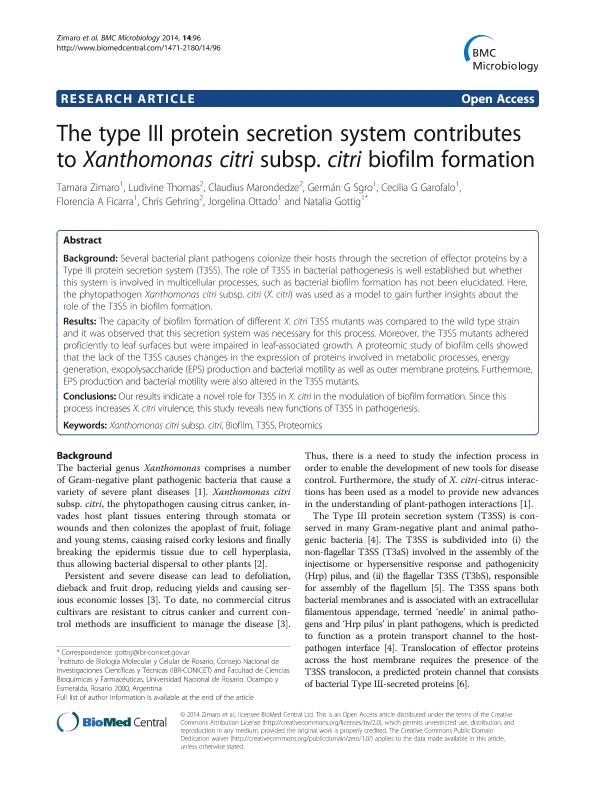Artículo
The type III protein secretion system contributes to Xanthomonas citri subsp. citri biofilm formation
Zimaro, Tamara ; Thomas, Ludivine; Marondedze, Claudius; Sgro, Germán Gustavo
; Thomas, Ludivine; Marondedze, Claudius; Sgro, Germán Gustavo ; Garofalo, Cecilia Graciela
; Garofalo, Cecilia Graciela ; Ficarra, Florencia Andrea
; Ficarra, Florencia Andrea ; Gehring, Chris; Ottado, Jorgelina
; Gehring, Chris; Ottado, Jorgelina ; Gottig Schor, Natalia
; Gottig Schor, Natalia
 ; Thomas, Ludivine; Marondedze, Claudius; Sgro, Germán Gustavo
; Thomas, Ludivine; Marondedze, Claudius; Sgro, Germán Gustavo ; Garofalo, Cecilia Graciela
; Garofalo, Cecilia Graciela ; Ficarra, Florencia Andrea
; Ficarra, Florencia Andrea ; Gehring, Chris; Ottado, Jorgelina
; Gehring, Chris; Ottado, Jorgelina ; Gottig Schor, Natalia
; Gottig Schor, Natalia
Fecha de publicación:
04/2014
Editorial:
Biomed Central
Revista:
Bmc Microbiology
ISSN:
1471-2180
Idioma:
Inglés
Tipo de recurso:
Artículo publicado
Clasificación temática:
Resumen
Background: Several bacterial plant pathogens colonize their hosts through the secretion of effector proteins by a Type III protein secretion system (T3SS). The role of T3SS in bacterial pathogenesis is well established but whether this system is involved in multicellular processes, such as bacterial biofilm formation has not been elucidated. Here, the phytopathogen Xanthomonas citri subsp. citri (X. citri) was used as a model to gain further insights about the role of the T3SS in biofilm formation.
Results: The capacity of biofilm formation of different X. citri T3SS mutants was compared to the wild type strain and it was observed that this secretion system was necessary for this process. Moreover, the T3SS mutants adhered proficiently to leaf surfaces but were impaired in leaf-associated growth. A proteomic study of biofilm cells showed that the lack of the T3SS causes changes in the expression of proteins involved in metabolic processes, energy generation, exopolysaccharide (EPS) production and bacterial motility as well as outer membrane proteins. Furthermore, EPS production and bacterial motility were also altered in the T3SS mutants.
Conclusions: Our results indicate a novel role for T3SS in X. citri in the modulation of biofilm formation. Since this process increases X. citri virulence, this study reveals new functions of T3SS in pathogenesis.
Palabras clave:
Xanthomonas Citri Subsp Citri
,
Biofilm
,
T3ss
,
Proteomics
Archivos asociados
Licencia
Identificadores
Colecciones
Articulos(IBR)
Articulos de INST.DE BIOLOGIA MOLECULAR Y CELULAR DE ROSARIO
Articulos de INST.DE BIOLOGIA MOLECULAR Y CELULAR DE ROSARIO
Citación
Zimaro, Tamara; Thomas, Ludivine; Marondedze, Claudius; Sgro, Germán Gustavo; Garofalo, Cecilia Graciela; et al.; The type III protein secretion system contributes to Xanthomonas citri subsp. citri biofilm formation; Biomed Central; Bmc Microbiology; 14; 96; 4-2014; 96-111
Compartir
Altmétricas



